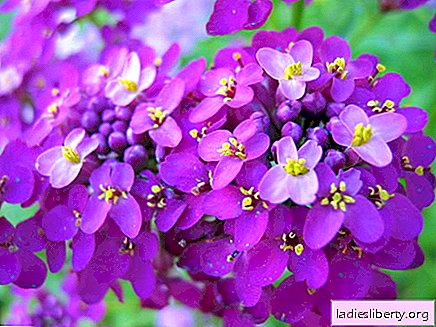
Iberis - general description
Iberis (bitter Iberian) is a herbaceous plant with a ribbed stem, elongated cirrus leaves wedge-shaped and small purple or white flowers collected in inflorescence. The height of Iberis is from 15 to 40 centimeters. The plant blooms from June to July, reaches full maturity in August.
Iberis - types and places of growth
In nature, there are about four dozen species of Iberis that grow in Central and Southern Europe, the Mediterranean and Asia Minor. Spain is considered the birthplace of Iberis, it is to this country that the plant owes its name.
The highest concentration of plants is observed on the Crimean peninsula, in the southern regions of Russia and in the Caucasus. In the territory of the CIS countries, four varieties of Iberis are common, not only grassy plants, but even shrubs are found.
Iberis usually grows on rocks and loose calcareous soil, sometimes found in cultivated fields, specially grown in flower beds as a decorative culture.
Iberis - healing properties
Iberis has healing properties and is actively used in traditional medicine and pharmacology. Medicines made from the plant help with diseases of the cardiovascular system, disorders of the gastrointestinal tract (ulcer, gastritis), it is used as a choleretic agent, kidneys, relieves serious pain and swelling in uterine tumors, and stimulates appetite.
Folk healers use Iberis for tonsillitis, bronchitis and pneumonia. Compresses are prepared from the plant, if it is necessary that the wound on the body is healed, the drug is used to treat gout.
Iberis - dosage forms
For medicinal purposes, use the aerial parts of the plant, harvesting is done during flowering (June-July), the seeds are collected in August. Iberis is cut, dried (do not allow sunlight) in a well-ventilated area and stored in cotton bags.
Iberis - recipes
The drug from Iberis is prepared depending on the purpose. We offer several folk recipes.
Infusion for hepatitis, cholecystitis, gout and respiratory diseases:
Pour 1 teaspoon of dry Iberis grass with 1.5 cups of boiling water, leave for an hour, then strain and apply 1 tablespoon several times a day after meals.
Iberis infusion for wound healing:
1 teaspoon of dry Iberis pour 2/3 cup boiling water, leave for an hour, strain. Prepare a compress and apply to problem areas.
Iberis infusion for the prevention and treatment of heart disease:
20 grams of crushed seeds, fill in 2/3 cups of vodka, let the medicine infuse for three weeks, then strain and take three times a day, 7-10 drops diluted in ¼ cup of water.
Iberis - contraindications
Despite its useful properties, Iberis is a poisonous plant and can be quite dangerous if it is improperly prepared, long-term poor storage or preparation of tinctures or decoctions. Plant-based medicines are strictly contraindicated in pregnant women, nursing mothers, and children of all ages.
Before using Iberis, you should consult a doctor, the independent use of alternative recipes is fraught with very serious consequences, up to death.
An overdose of the drug can cause cardiac arrest, a milder form of "poisoning" can occur in the form of nausea, dizziness, vomiting, general weakness and fatigue.
Comments











